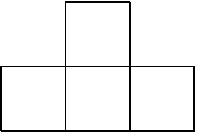Problems
There are 25 points on a plane, and among any three of them there can be found two points with a distance between them of less than 1. Prove that there is a circle of radius 1 containing at least 13 of these points.
A unit square contains 51 points. Prove that it is always possible to cover three of them with a circle of radius \(\frac{1}{7}\).
What is the minimum number of points necessary to mark inside a convex \(n\)-gon, so that at least one marked point always lies inside any triangle whose vertices are the vertices of the polygon?
A plane contains \(n\) straight lines, of which no two are parallel. Prove that some of the angles will be smaller than \(180^\circ/n\).
Several chords are drawn through a unit circle. Prove that if each diameter intersects with no more than \(k\) chords, then the total length of all the chords is less than \(\pi k\).
Several circles, whose total length of circumferences is 10, are placed inside a square of side 1. Prove that there will always be some straight line that crosses at least four of the circles.
A square of side 15 contains 20 non-overlapping unit squares. Prove that it is possible to place a circle of radius 1 inside the large square, so that it does not overlap with any of the unit squares.
a) A square of area 6 contains three polygons, each of area 3. Prove that among them there are two polygons that have an overlap of area no less than 1.
b) A square of area 5 contains nine polygons of area 1. Prove that among them there are two polygons that have an overlap of area no less than \(\frac{1}{9}\).
Cut an arbitrary triangle into 3 parts and out of these pieces construct a rectangle.
Fill an ordinary chessboard \(8\times 8\) with the tiles shown in the figure.
